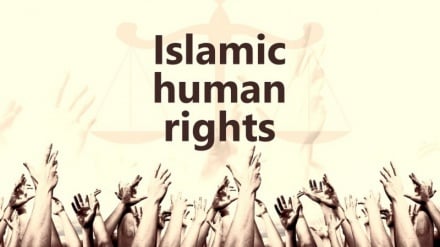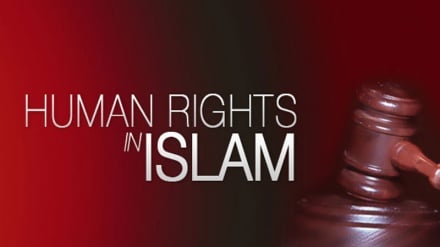Islamic Human Rights (26)
Welcome to the 26th weekly episode of the series Islamic Human Rights. In this episode, we study the viewpoint of the divine religion of Islam toward freedom.
Last week, we partly spoke of freedom in the view of Islam and its differences with the concept of freedom in the view of Western thinkers. Also, it was pointed out that freedom in the view of Islam is rooted in monotheistic standpoint. In fact, monotheism and servitude of God are embedded in the concept of Islamic freedom.
As it was mentioned, in Islam, in addition to outside obstructions such as colonial powers, oppressors, and those who limit human freedom; a string of inner hurdles have also been specified that restrict human freedom, such as a number of human traits; namely corruption, carnal desires, and selfishness which undermine and degrade human beings.
In Islamic viewpoint, an individual who is forced to accept a number of restrictions due to weakness, fear, greed, and carnal desires, is not free in the true essence of the word. This is because the sacred religion of Islam values and treasures human beings and doesn’t allow their honor and dignity to be sabotaged by misdeeds and corruption. Freedom in Islamic viewpoint is tantamount to liberation from the yoke of carnal desires and servitude of anyone other than God.
Freedom is a divine blessings in the Islamic outlook, via which mankind finds his path to prosperity. Islam has allowed mankind to choose his path toward prosperity and freedom, upon removal of hurdles and establishment of the appropriate conditions. Meanwhile, in the Islamic outlook, freedom also brings about a number of duties and responsibilities. Humans are free because they accept responsibility for their actions. Hence, a Muslim tries to prudently benefit from his freedom. In other words, a Muslims accepts a number of restrictions alongside freedom to secure his prosperity in the material world and Hereafter.
This is while in Western Liberalism, freedom contradicts responsibility. This is because in Western ideology, freedom is rooted in man’s inclinations and desires. Freedom in Western outlook is synonymous to refusal to accept any responsibility. In the perspective of Western philosophers, mankind is a creature that maintains a series of demands, which in turn form the basis of his freedom. In fact, in Western thinkers’ outlook, there is no difference in freedom of mankind and freedom of animals.
The innate nature of mankind is a blend of wisdom and soul. Hence, it is impossible for mankind to attain absolute freedom in each of his two aspects. Freedom in each of these two dimensions of mankind, limits the freedom of the other dimension and aspect. Hence, if mankind would seek freedom in its materialistic aspect, he cannot attain absolute freedom in his spiritual dimension.
Meanwhile, a number of elevated talents are embedded in mankind; which are the criteria for his humanity. Man’s logic and inclinations toward goodness, beauty, and worship of God are his humane traits. In Islam, the peak of mankind is embedded in his humanity and elevated emotions and sentiments. So, Islam wants to materialize and fulfill true freedom of mankind via liberation of man from the yoke of carnal desires. Human spirit is liberated if mankind would be able to fully and freely cover the path toward humanity and prosperity. Thus, in Islamic outlook, freedom is an inalienable right of mankind which originates from his inner talents.
Mankind has been granted a number of God-given talents which should emerge, while other humans should not obstruct the emergence and materialization of these talents and potentials. Hence, freedom means liberation from hurdles which impede the growth of man’s God-given talents.
Therefore, freedom is a means of mankind for attainment of growth and perfection. In fact, the goal of mankind is not to be free. However, mankind should be free to reach perfection. Meanwhile, this definition of freedom is highly treasured in Quranic standpoint.
In the view of Holy Quran, freedom is prelude to existence. All of the freedoms of mankind aim to create a valuable existence for him. For man to attain an honorable material and spiritual existence, he should be free, and in order to attain freedom, he should liberate himself from the yoke of his carnal desires. So, the true freedom of mankind is attained via his liberation from commitment of sins by repentance. This freedom marks a prelude to man’s elevated life and existence.
MR/MG


